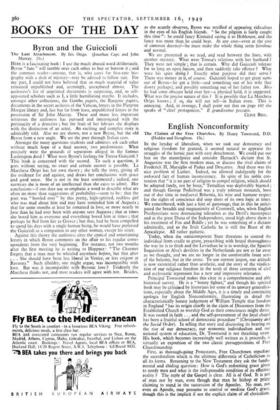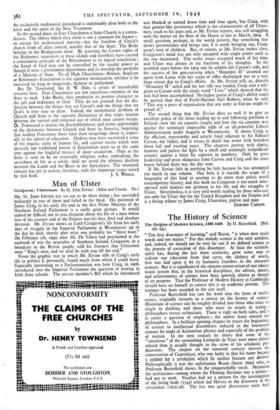English Nonconformity
The Claims of the Free Churches. By Henry Townsend, D.D. (Hodder and Stoughton. 15s.) The Claims of the Free Churches. By Henry Townsend, D.D. (Hodder and Stoughton. 15s.) IN the heyday of liberalism, when we took our democracy and religious freedom for granted, it seemed natural to appraise the struggles of the heroic past with easy detachment. We could put our feet on the mantelpiece and consider Harnack's dictum that St. Augustine was the first modern man, or discuss the rival claims of Frederick H, Marsiglio of Padua and Descartes. And there was the nice problem of Luther. Indeed, we allowed indulgently for the awkward fact of human inconsistency. In spite of his noble con- tention that " it is no part of religion to compel religion, which should be adopted freely, not by force," Tertullian was deplorably bigoted ; and though George Podiebrad was a truly tolerant monarch, born out of due time in mediaeval Bohemia, his wise and humane respect for the rights of conscience did stop short of its own logic at times. We remembered, with just a hint of patronage, that in this he antici- pated the breadth and magnanimity of Cromwell, who, when English Presbyterians were denouncing toleration as the Devil's masterpiece and as the great Diana of the Independents, stood high above them in his treatment of Fox and Biddle ; yet he was something of a dictator admittedly, and to the Irish Catholic he is still the Beast of the Apocalypse. All rather pathetic.
Today, when the omnicompetent State threatens to control the individual from cradle to grave, prescribing with brutal thoroughness the way he is to think and the Leviathan he is to worship, the Spanish Inquisition or Alva's devilries in the Netherlands are not as far away as we thought, and we are no longer in the comfortable front seats of the balcony, but in the arena. To use current jargon, our attitude is now existential rather than aesthetic, and the story of the vindica- tion of our religious freedom in the teeth of three centuries of civil and ecclesiastic repression has a new and impressive relevance.
Principal Townsend makes this clear in a comprehensive and able historical survey. He is a " bonny fighter," and though his spirited book may be criticised by historians for some of its unwary generalisa- tions, especially abOut the Middle Ages, it is a timely and convincing apologia for English Nonconformity, illustrating in detail the characteristically honest judgement of William Temple that freedom in England "has its origin chiefly in the claim of Dissenters from the Established Church to worship God as their consciences might direct. It was rooted in faith ... and the self-government of the local chapel has been a fruitful school of democratic procedure" (Christianity and the Social Order). In telling that story and discussing its bearing on the rise of our democracy, our economic individualism and our national system of education, Dr. Townsend is not thrashing straw. His book, which becomes increasingly well written as it proceeds, 15 virtually an exposition of the two classic presuppositions of Free Churchmanship.
First, as thorough-going Protestants, Free Churchmen repudiate the sacerdotalism which is the ultimate differentia of Catholicism in all its forms. Returning to the New Testament they ask the funda- mental and abiding question: How is God's redeeming grace given to needy men and what is the indispensable condition of its effective reality ? The reply of the Gospel is clear. All is of God. It is not of man nor by man, even though that man be bishop or priest claiming to stand in the succession of the Apostles. No man, not even an Apostle, may presume to control or mediate God's grace, though this is the implicit if not the explicit claim of all clericalism.
An exclusively mediatorial priesthood is indubitably alien both to the letter and the spirit of the New Testament.
In the second place, to Free Churchmen a State Church is a contra- diction. The liberty which they claim is not a synonym for licence— an excuse for ecclesiastical anarchy—but the freedom of Christ's church from all alien control, notably that of the State. The Bride belongs to the Bridegroom alone. By asserting the Crown rights of the Redeemer, separatists in these islands and elsewhere have carried a constitutive principle of the Reformation to its logical conclusion ; the Israel of God may not be controlled by the secular power as though It were a government department and its worship the portfolio of a Minister of State. To all High Churchmen—Roman, Anglican or Reformed—Erastianism is the supreme abomination, whether it be. exercised by king or magistrate, dictator or parliament.
But Dr. Townsend, like R. W. Dale, is aware of irresolvable tensions here. Free Churchmen are not anarchists—enemies of the State as such. Like Burke, they emphasise its positive character as the gift and ordinance of God. They do not pretend that the dis- 'tinction between the things that are Caesar's and the things that are God's is ever easy to draw. Indeed, the immemorial problem of Church and State is the supreme illustration of that tragic tension between the eternal and temporal out of which man cannot escape. (4.1r. Townsend is zealous for disestablishment, and points approvingly to the dichotomy between Church and State in America, forgetting that leading Protestants there have their misgivings about it, especi- ally in the sphere of education. Modern men have recovered a sense of the organic unity of human life, and current events which only intensify our traditional horror of Erastianism warn us at the same time against the frightful menace of sheer secularism. Only as the State is seen to be an essentially religious order, embodying the sacredness of life as a whole; shall we avoid the ultimate dualism between the Lamb and the Beast in the Apocalypse. The twentieth century has yet to reckon, therefore, with the important issues raised
by this book. J. S. WHALE.



































 Previous page
Previous page